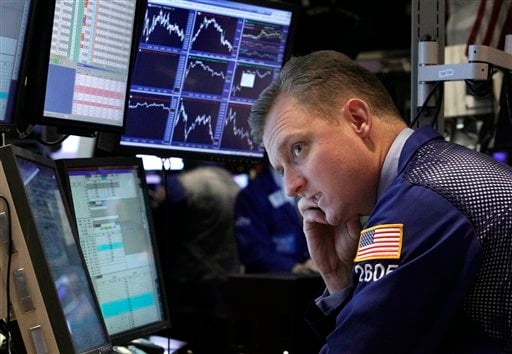Stocks are set to continue their slide when the market opens Friday as the dollar strengthens further, and after a week of mixed economic reports. Futures are modestly lower.
Overseas, Asian markets declined, but European markets rose modestly ahead of a key speech from European Central Bank president Jean-Claude Trichet.
With little economic news to help sway the market Friday, the dollar is again pressuring stocks. A strengthening dollar drives down foreign demand for commodities, which are often traded in dollars. It also can depress U.S. exports which become more expensive as the dollar rises.
That can hurt the price of energy and materials stocks that are closely tied to commodities and companies with large operations overseas.
A disappointing earnings report from computer maker Dell Inc. is also weighing on the market. Dell said after the market closed Thursday that sales of its computers to big businesses remain sluggish. Its quarterly revenue and profit missed analysts' expectations.
Ahead of the opening bell, Dow Jones industrial average futures fell 47, or 0.5 percent, to 10,280. Standard & Poor's 500 index futures declined 5.50, or 0.5 percent, to 1,088.80, while Nasdaq 100 index futures fell 6.25, or 0.4 percent, to 1,764.00.
The ICE Futures US dollar index, which measures the dollar against other major currencies, rose 0.22 to 75.51.
Weak housing and mortgage data the past two days has helped bring the market's nearly relentless rise to a halt amid concerns any economic recovery will be slow and bumpy. On Thursday, the Mortgage Bankers Association provided fresh evidence that the housing market is still fragile. The trade group said more than 14 percent of homeowners with a mortgage were behind in their payments or facing foreclosure at the end of September.
Technology shares fell sharply after an analyst downgraded the chip sector. The tech-heavy Nasdaq composite index fell 1.7 percent. The Dow fell 0.9 percent, while the S&P declined 1.3 percent.
As investors have jumped out of stocks in recent days, they have moved money into safe assets like Treasury bonds, pushing their prices higher. The yield on the three-month T-bill, which moves opposite its price, fell to its lowest level since last December as the credit crisis was mushrooming. The yield hit 0.005 percent late Thursday.
The three-month yield moved higher Friday, rising to 0.02 percent.
The yield on the benchmark 10-year Treasury note was unchanged at 3.34 percent compared with late Thursday.
Overseas, Japan's Nikkei stock average declined 0.5 percent. Britain's FTSE 100 rose 0.2 percent, Germany's DAX index gained 0.2 percent, and France's CAC-40 climbed 0.2 percent.







